Spoken English
2020人教版九年级英语上Unit1课文重难点讲解
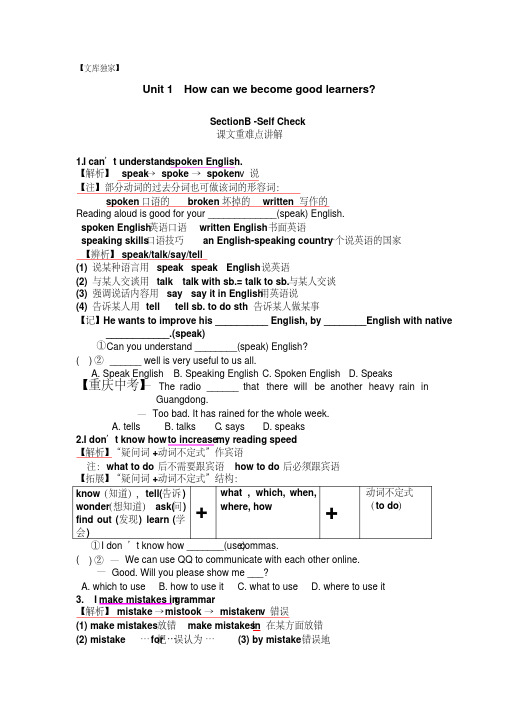
【文库独家】Unit 1 How can we become good learners?SectionB -Self Check课文重难点讲解1.I can’t understand spoken English.【解析】speak→spoke →spoken v说【注】部分动词的过去分词也可做该词的形容词:spoken 口语的broken 坏掉的written 写作的Reading aloud is good for your _____________(speak) English.spoken English 英语口语written English 书面英语speaking skills 口语技巧an English-speaking country 一个说英语的国家【辨析】speak/talk/say/tell(1) 说某种语言用speak speak English 说英语(2) 与某人交谈用talk talk with sb.= talk to sb. 与某人交谈(3) 强调说话内容用say say it in English 用英语说(4) 告诉某人用tell tell sb. to do sth 告诉某人做某事【记】He wants to improve his __________ English, by ________English with native ____________.(speak)①Can you understand ________(speak) English?( )②______ well is very useful to us all.A. Speak EnglishB. Speaking EnglishC. Spoken EnglishD. Speaks【重庆中考】—The radio ______ that there will be another heavy rain inGuangdong.—Too bad. It has rained for the whole week.A. tellsB. talksC. saysD. speaks2.I don’t know how to increase my reading speed【解析】“疑问词+动词不定式”作宾语注:what to do 后不需要跟宾语how to do 后必须跟宾语【拓展】“疑问词+动词不定式”结构:know(知道),tell(告诉)wonder(想知道)ask(问) find out (发现) learn (学会) +what , which, when,where, how +动词不定式(to do)①I don’t know how _______(use) commas.( )②—We can use QQ to communicate with each other online.—Good. Will you please show me ___?A. which to useB. how to use itC. what to useD. where to use it3. I make mistakes in grammar【解析】mistake→mistook →mistaken v错误(1) make mistakes 放错make mistakes in在某方面放错(2) mistake …for… 把…误认为… (3) by mistake 错误地。
Spoken English(英语口语)

英语说话的作文

英语说话的作文Title: The Art of Spoken English。
English, the lingua franca of our modern world, holds immense power. Mastering spoken English opens doors to communication, education, and opportunity. In this essay,we delve into the nuances of spoken English, exploring its importance, challenges, and strategies for improvement.Firstly, let's acknowledge the significance of spoken English. In today's globalized society, effective communication is paramount. Whether in business negotiations, academic discussions, or casual conversations, proficiency in spoken English facilitates clarity and understanding. Moreover, it fosters cultural exchange and mutual respect, bridging gaps between people of diverse backgrounds.However, mastering spoken English is not without its challenges. Pronunciation, intonation, and fluency areareas where many learners struggle. Accents vary widely across regions and countries, further complicating comprehension. Additionally, idiomatic expressions and colloquialisms pose hurdles for non-native speakers, requiring familiarity with cultural nuances.So, how can one improve their spoken English skills? The journey begins with a strong foundation in grammar and vocabulary. A thorough grasp of sentence structure and word usage forms the basis for coherent communication. Beyond that, practice makes perfect. Engaging in conversations with native speakers, joining language exchange programs, and participating in group discussions are invaluable opportunities for honing spoken English skills.Listening plays a pivotal role in improving spoken English. By actively listening to English speakers, learners can pick up on pronunciation patterns, intonation variations, and idiomatic expressions. Watching English movies, listening to podcasts, and following English news channels are effective ways to immerse oneself in the language.Furthermore, mimicking native speakers can aid in improving pronunciation and intonation. Shadowing, a technique where learners repeat sentences spoken by native speakers, helps develop a natural rhythm and flow in speech. It's akin to learning a musical instrument—repeatedpractice leads to proficiency.Another aspect to consider is confidence. Many non-native speakers feel self-conscious about their English abilities, fearing ridicule or judgment. Overcoming this mental barrier is crucial. Embracing mistakes as learning opportunities and maintaining a positive attitude can boost confidence levels. Remember, everyone makes mistakes, even native speakers.Moreover, cultural sensitivity enhances spoken English proficiency. Understanding cultural references, norms, and etiquette contributes to effective communication. It's not just about mastering the language; it's also about understanding the context in which it is used.In conclusion, spoken English is a powerful tool that opens doors to countless opportunities. While mastering it may pose challenges, with dedication, practice, and a positive mindset, anyone can improve their spoken English skills. So, let's embark on this journey of linguistic mastery, one conversation at a time.。
人教版英语七年级课件PPT Spoken English

Work quietly!
ENTER THE TITLE HERE
Please enter the text you need here.
ENTER THE TITLE HERE
Please enter the text you need here.
ENTER THE TITLE HERE
Please enter the text you need here.
Please enter the text you need here. Please enter the
text you need here. Please enter the text you need
here. Please enter the text you need here. Please enter the
ENTER THE TITLE HERE
Please enter the text you need here.
ENTER THE TITLE HERE
Please enter the text you need here.
ENTER THE TITLE HERE
Please enter the text you need here.
My favourite seUanisto1n
My favourite season
PLEASE ENTER THE TITLE HERE
Please enter the text you need here. Please enter the text you need here. Please enter the text you need here.
Please enter the text you need here. Please enter the text you need here
经典 Spoken English

1.I wasn't born yesterday.(我又不是三岁小孩)2.How do I address you?(我怎么称呼你)3.She turns me off.(她使我厌烦。
)4.So far so good.(目前为止,一切都好。
)5.Be my guest.(请便、别客气)6.That was a close call.(太危险了/千钧一发)7.Far from it.(一点也不。
)8.It's a pain in the neck[麻烦的事(人)].(那真是件麻烦事)9.We're in the same boat.(我们处境相同。
)10.My mouth is watering.(我在流口水了。
)11.I ache all over.(我浑身酸痛。
)12.I have a runny nose.(我流鼻涕。
)13.Do you have any openings?(你们有空缺吗?)14.Think nothing of it.(别放在心上。
)15.I'm not myself today.(我今天心神不宁。
)16.I have a sweet tooth.(我喜欢吃甜食。
)17.For the time being.(暂时;暂且;目前)18.Don't beat around the bush. (别拐弯抹角了。
)19.It's up on the air[悬而未决].(尚未确定。
)20.It slipped my mind.(我忘了。
)21.You can't please[使人感到满意和愉快] everyone.(你不可能讨好每一个人。
)22.I'm working on[着手;从事] it.(我正在努力。
)23.You bet!(当然!)24.Drop me a line[短信].(写封信给我)25.Are you pulling my leg[同某人开玩笑;取笑]?(你在开我玩笑吗?)26.I'll keep my ears open.(我会留意的。
Spoken English

以下是在网上收集到的美国人常用的spoken English,然后根据朋友传授的在美国日常生活中真正听到的进行了删选!quit it! 别闹!Don't mention it. 没关系,别客气。
Who knows! 天晓得!It is not a big deal! 没什么了不起!How come…怎么回事,怎么搞的。
Don't push me. 别逼我。
Come on! 快点,振作起来!(come on的含义很多,主要体现在语气上,使用时请注意语气)Have a good of it.玩的很高兴。
It is urgent. 有急事。
What is the fuss?吵什么?Still up?还没睡呀?It doesn't make any differences. 没关系。
Don't let me down. 别让我失望。
God works. 上帝的安排。
Hope so. 希望如此。
get to the point言归正传。
(go down to business我感觉没有get to the point常用,所以换掉)None of my business. 不关我事。
It doesn't work. 不管用。
I'm not going. 我不去了。
Does it serve your purpose?对你有用吗?I don't care. 我不在乎。
Not so bad. 不错。
No way! 不可能!Don't flatter me. 过奖了。
Your are welcome. 你太客气了。
It is a long story. 一言难尽。
Between us. 你知,我知。
Big mouth! 多嘴驴!Sure thin! 當然!(我觉得Sure更加popular! I like to use SURE...)I''m going to go. 我這就去。
Spoken English口语小知识
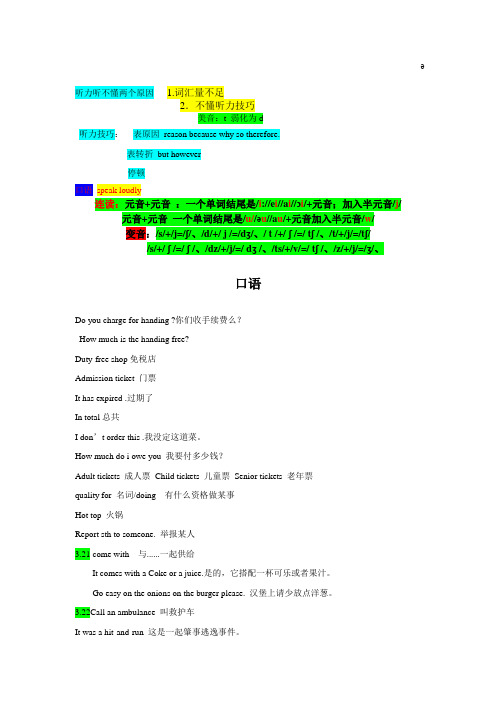
ə听力听不懂两个原因 1.词汇量不足2.不懂听力技巧美音:t 弱化为d听力技巧:表原因reason because why so therefore.表转折but however停顿口语speak loudly连读:元音+元音:一个单词结尾是/i://e i//a i//ɔi/+元音;加入半元音/j/ 元音+元音一个单词结尾是/u//əu//a u/+元音加入半元音/w/变音:/s/+/j=/ʃ/、/d/+/ j /=/dʒ/、/ t /+/ ʃ /=/ tʃ /、/t/+/j/=/tʃ//s/+/ ʃ /=/ ʃ /、/dz/+/j/=/ dʒ /、/ts/+/v/=/ tʃ /、/z/+/j/=/ʒ/、口语Do you charge for handing ?你们收手续费么?How much is the handing free?Duty-free shop免税店Admission ticket 门票It has expired .过期了In total总共I don’t order this .我没定这道菜。
How much do i owe you 我要付多少钱?Adult tickets 成人票Child tickets 儿童票Senior tickets 老年票quality for 名词/doing 有什么资格做某事Hot top 火锅Report sth to someone. 举报某人3.21 come with 与......一起供给It comes with a Coke or a juice.是的,它搭配一杯可乐或者果汁。
Go easy on the onions on the burger please. 汉堡上请少放点洋葱。
3.22Call an ambulance 叫救护车It was a hit-and-run 这是一起肇事逃逸事件。
Take off 脱下衣服飞机起飞。
Authentic Spoken English

Authentic Spoken English1.关于音标①音标是练好地道口音的基础,包括嘴型、舌位、发声位置等。
②音标体系:国际音标(International Phonetic Alphabet,缩写:IPA),早期又称万国音标,是一套用来标音的系统,以拉丁字母为基础,由国际语音学学会设计来作为口语声音的标准化标示方法。
大陆英语教材、各类词典中常用到的音标,其实是最新的“DJ音标”(1988),仅采用国际音标中的一部分,并且稍作修改。
国际音标甚至包括闪音(弹音)、颤音等,可以标注各类小语种的发音。
因此我们称英语“教科书”上的音标为“国际音标”是不大准确的。
DJ音标,与英国语音学家丹尼尔.琼斯(Daniel Jones)有关。
他根据IPA 编了一本英国英语的发音辞典English Pronouncing Dictionary(第1版至第12版,最后一版的出版时间为1963年)。
其内容与IPA相比其实改动也不是很大,为了简洁,如把IPA中的/ɹ/,换成/r/。
但是在IPA中,也有[r],它是西班牙语、意大利语、俄语里面的大舌颤音。
新版的DJ音标,于旧版的DJ音标而言,其修改了一些音标的写法。
大陆英语教材、各类词典中常用到的音标,是最新的“DJ音标”(1988),也称“IPA88”或“Gimson音标”。
IPA88由A.C.Gimson(Daniel Jones的学生,英国伦敦大学的语音学教授)修订,使IPA63的对应音标更加分明。
如用[ɜ:]代替了[ə:],[ɒ]代替了[ɔ]等。
K.K.音标,也称“美式音标”。
作者为John S.Kenyon&Thomas A.Knott,人们也把美语标准发音惯称为K.K.音标。
K.K.音标的/ʌ/实际上是[ɜ],此音与/ə/很相似,只是口型要大一些。
美音中,有时习惯上也将单元音/o/的位置读成双元音/oʊ/,将单元音/e/的位置读成双元音/eɪ/。
K.K.音标最大的特点是带入了美音特有的儿音,如/ɝ/、/ɚ/。
口头英语的优缺点作文

口头英语的优缺点作文Title: Advantages and Disadvantages of Spoken English。
Spoken English has become increasingly prevalent in today's globalized world, serving as a vital means of communication across cultures and borders. However, like any form of language communication, it possesses both advantages and disadvantages.Advantages:1. Real-Time Interaction: One of the primary advantages of spoken English is its ability to facilitate real-time interaction. Through spoken language, individuals can engage in face-to-face conversations, allowing for immediate feedback, clarification, and understanding. This real-time interaction fosters more dynamic and nuanced communication compared to written forms.2. Expressiveness: Spoken English enables individualsto convey emotions, intentions, and nuances moreeffectively than written communication. Tone of voice, intonation, and non-verbal cues such as facial expressions and gestures enrich the message, making it more comprehensible and engaging for the listener.3. Cultural Exchange: Spoken English serves as a medium for cultural exchange, enabling individuals from diverse backgrounds to share their perspectives, traditions, and experiences. Through conversations, people gain insights into different cultures, fostering mutual understanding and appreciation.4. Rapid Communication: Spoken English facilitates quick and efficient communication, especially in situations where immediate responses are required. Whether in casual conversations or professional settings, the ability to communicate orally can expedite decision-making processes and problem-solving.5. Informal Communication: Spoken English often lends itself to informal communication settings, such as socialgatherings, casual meetings, or everyday interactions. This informal nature promotes spontaneity, creativity, and camaraderie among participants, fostering stronger interpersonal connections.Disadvantages:1. Lack of Precision: One of the drawbacks of spoken English is its potential for ambiguity and lack of precision. Unlike written communication, where words are carefully chosen and structured, spoken language may be prone to misunderstandings or misinterpretations due to the absence of visual aids and the reliance on auditory cues alone.2. Limited Accessibility: Spoken English may pose challenges for individuals with hearing impairments or those who are not proficient in the language. Thislimitation can hinder effective communication and marginalize certain groups, contributing to linguistic barriers and social exclusion.3. Difficulty in Documentation: Unlike written communication, which can be easily documented and referenced for future use, spoken English lacks the permanence and reliability of written records. This can be problematic in formal settings where accurate documentation is essential for legal, academic, or professional purposes.4. Cultural and Regional Variations: Spoken English exhibits significant cultural and regional variations, leading to potential misunderstandings or communication barriers, particularly in multicultural environments. Dialects, accents, slang, and idiomatic expressions may vary widely, posing challenges for effective cross-cultural communication.5. Ineffective Communication Skills: While spoken English offers numerous benefits, individuals may still struggle with effective communication skills, such as articulation, active listening, and empathy. Poor communication skills can impede comprehension, hinder collaboration, and lead to interpersonal conflicts or misunderstandings.In conclusion, spoken English plays a pivotal role in facilitating interpersonal communication, cultural exchange, and social interaction in today's globalized world. Whileit offers various advantages, such as real-time interaction and expressiveness, it also presents challenges such aslack of precision and limited accessibility. By recognizing these advantages and disadvantages, individuals can striveto maximize the benefits of spoken English while mitigating its limitations through effective communication strategies and cultural awareness.。
Spoken English(1)Introduction
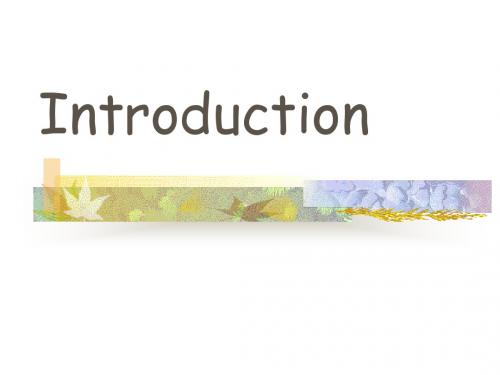
Situations
Zhang Wei is introducing some more students to each other. Wang fang takes Ma Lan to the library to meet Miss Li, the librarian. She introduces them. Zhang Wei pays Professor Liu a call. He meets Mrs. Liu and is introduced. Wu Xiao is a local student. It is Sunday. He invites Wang Fang and Ma Lan to his home. Wu introduces them to his parents and his little sister.
Conversation 4
(Zhang Wei and Mr. Li, a new teacher, are waiting for Prof. Liu, the Dean, in his office.) A: I don’t think we’ve met. My name’s Li Guang. B: Hello, I’m Zhang Wei. Delighted to meet you. A: Pleased to meet you, too. Zhang Wei. Where are you from? B: Qingdao. And you? A: Well, it’s certainly a small world. I’m from Qingdao, too. B: Really? How nice to meet some from my hometown. I’m feeling homesick already. A: Cheer up. You’ll soon forget everything when classes begin. B: I’m sure I will. By the way, are you also one of the new students? A: No, I’m a new teacher.
spokenenglish.ppt

B:I think it’s a western.
documentary(纪录片).
A:do you mind if I switch over?
A:dose anybody mind I watch it?
B:well,I rather wanted to see the football match.
days.
PART 7 AT HOME
Pattern I televisoin
2) A:do you happen to know
1)A:is there anything wort?
wathing on the other channel? B:I’ve got a feeling it’s a
A:how much it is? B:£9 per week including
heating.
A:do you think I could have a look at it,please?
B:we’re having it decorated at the moment.will Friday do?
B:You’d better have silver,then.
Pattern ii telephoning A:Eastbourne 54655. B:hello.Jhon here.can I speak to
Mary,please? A:hold the line,please? B:ok A:soorry,but she’s out. B:would you tell her I rang? A:I’d be glad to.
SPOKEN ENGLISH
Zhao Juan Ling
Spoken English
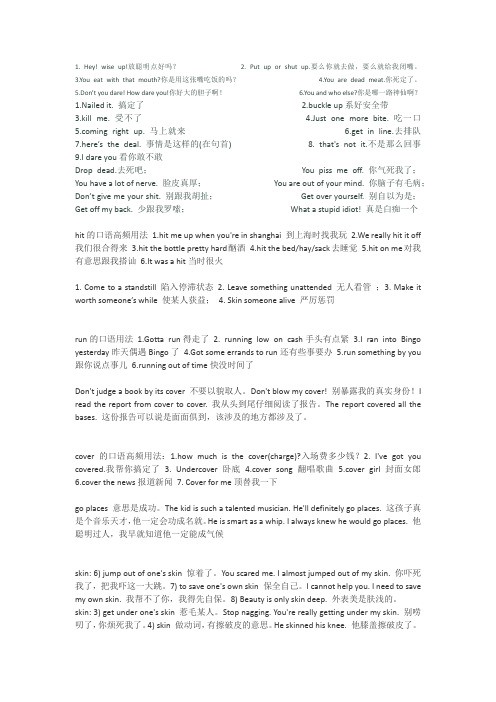
1. Hey! wise up!放聪明点好吗?2. Put up or shut up.要么你就去做,要么就给我闭嘴。
3.You eat with that mouth?你是用这张嘴吃饭的吗?4.You are dead meat.你死定了。
5.Don't you dare! How dare you!你好大的胆子啊!6.You and who else?你是哪一路神仙啊?1.Nailed it. 搞定了 2.buckle up系好安全带3.kill me. 受不了4.Just one more bite. 吃一口ing right up. 马上就来6.get in line.去排队7.here’s the deal.事情是这样的(在句首)8. that's not it.不是那么回事9.I dare you看你敢不敢Drop dead.去死吧;You piss me off. 你气死我了;You have a lot of nerve. 脸皮真厚;You are out of your mind. 你脑子有毛病;Don’t give me your shit. 别跟我胡扯;Get over yourself. 别自以为是;Get off my back. 少跟我罗嗦;What a stupid idiot! 真是白痴一个hit的口语高频用法1.hit me up when you're in shanghai 到上海时找我玩2.We really hit it off 我们很合得来3.hit the bottle pretty hard酗酒4.hit the bed/hay/sack去睡觉5.hit on me对我有意思跟我搭讪6.It was a hit当时很火1. Come to a standstill 陷入停滞状态2. Leave something unattended 无人看管;3. Make it worth someone’s while 使某人获益;4. Skin someone alive 严厉惩罚run的口语用法1.Gotta run得走了2. running low on cash手头有点紧3.I ran into Bingo yesterday昨天偶遇Bingo了4.Got some errands to run还有些事要办5.run something by you 跟你说点事儿6.running out of time快没时间了Don't judge a book by its cover 不要以貌取人。
spoken english

23. I'm going to go. 我这就去。
24. can-do 能人
25. Leave me alone. 别理我。
26. Don't pass the buck. 不要推卸责任
27. I can't put up with her. 我受不了她。
32. One man's meat is another man's poison. 对一个好的事对另外的人并不是好事。
33. Many hands make light work. 人多好干活。
34. I won't live on the handouts of other people. 我不会靠人家的施舍过活。
15 Can I reconfirm by phone?我能电话确认吗?
16 Where can I make a reservation? 我到哪里可以预订?
17 Do I need a reservation for the dining car? 我需要预订餐车吗?
18 How many more minutes will it take for the train to arrive?火车还要多少分钟就要到达呢?
2 Is there any earlier one?还有更早一点的吗?
3 Could you tell me my reservation number, please?请你告诉我我的预订号码好吗?
4 Can I get a seat for todays 7:00 a.m. train? 我可以买到今天上午7点的火车座位吗?
Understanding Spoken English(理解英语口语)
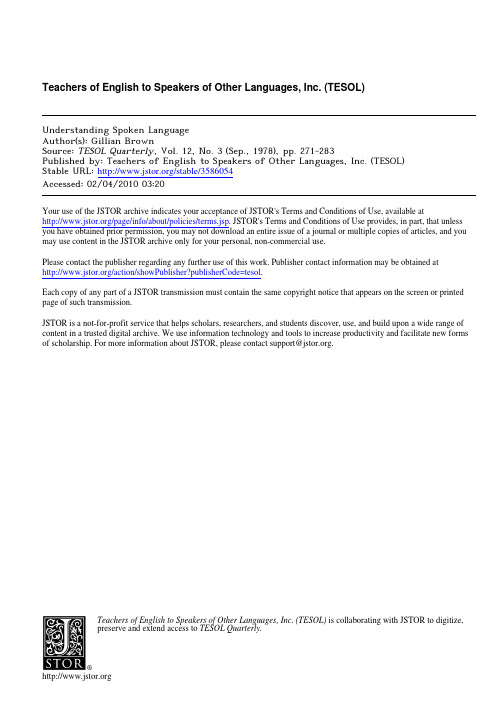
Teachers of English to Speakers of Other Languages, Inc. (TESOL)Understanding Spoken LanguageAuthor(s): Gillian BrownSource: TESOL Quarterly, Vol. 12, No. 3 (Sep., 1978), pp. 271-283Published by: Teachers of English to Speakers of Other Languages, Inc. (TESOL)Stable URL: /stable/3586054Accessed: 02/04/2010 03:20Your use of the JSTOR archive indicates your acceptance of JSTOR's Terms and Conditions of Use, available at/page/info/about/policies/terms.jsp. JSTOR's Terms and Conditions of Use provides, in part, that unless you have obtained prior permission, you may not download an entire issue of a journal or multiple copies of articles, and you may use content in the JSTOR archive only for your personal, non-commercial use.Please contact the publisher regarding any further use of this work. Publisher contact information may be obtained at/action/showPublisher?publisherCode=tesol.Each copy of any part of a JSTOR transmission must contain the same copyright notice that appears on the screen or printed page of such transmission.JSTOR is a not-for-profit service that helps scholars, researchers, and students discover, use, and build upon a wide range of content in a trusted digital archive. We use information technology and tools to increase productivity and facilitate new forms of scholarship. For more information about JSTOR, please contact support@.Teachers of English to Speakers of Other Languages, Inc. (TESOL) is collaborating with JSTOR to digitize,preserve and extend access to TESOL Quarterly.。
easy口语

easy口语Easy Spoken EnglishSpoken English is a fundamental skill that is essential for effective communication in today's globalized world. The ability to speak English fluently not only opens up opportunities for personal and professional growth but also enables individuals to connect with people from different cultures and backgrounds. In this article, we will explore some practical tips and strategies to improve your spoken English skills.1. Build a Strong FoundationTo become fluent in spoken English, it is crucial to have a solid foundation of vocabulary and grammar. Begin by expanding your vocabulary through regular reading and listening to English-language materials such as books, newspapers, podcasts, and movies. Make a habit of looking up unfamiliar words and phrases and try to use them in daily conversations. Additionally, focus on understanding and practicing grammar rules to improve your sentence structure and overall coherence in spoken English.2. Practice Speaking RegularlyThe key to improving spoken English is consistent practice. Find opportunities to engage in conversations with native English speakers or fellow English learners. Join language exchange groups or conversation clubs, where you can interact with others who are also keen on improving their spoken English. Practice speaking English in everyday situations, such as ordering food at a restaurant, asking for directions, or discussing hobbiesand interests with friends. The more you practice, the more confident you will become in expressing yourself in English.3. Listen and MimicListening to native English speakers is an excellent way to improve your pronunciation, intonation, and overall language rhythm. Watch English TV shows, movies, or listen to English podcasts, paying attention to the speaker's pronunciation and natural flow of speech. Try to mimic their pronunciation and rhythm to develop a more authentic spoken English style. You can also take advantage of language learning apps and online resources that offer interactive listening exercises and conversational practice.4. Focus on Fluency, not PerfectionWhile it is important to strive for accuracy in spoken English, fluency should be your ultimate goal. Don't be overly concerned about making mistakes or sounding perfect. Remember that making mistakes is a natural part of the learning process. Expose yourself to various English accents and dialects to become more adaptable and comfortable with different speaking styles. Embrace opportunities to practice speaking English, even if it means making some errors along the way.5. Use English in Daily LifeImmerse yourself in an English-speaking environment as much as possible. Change the language settings on your phone, computer, and other devices to English. Label items in your home with their English names to reinforce vocabulary learning. Surround yourself with English media, such as music, movies, and books, to familiarize yourself with idiomaticexpressions and everyday conversational phrases. Creating an English-speaking environment will help you think and communicate in English more naturally.6. Seek Professional HelpConsider enrolling in an English language course or hiring a language tutor to receive professional guidance and personalized feedback. A qualified instructor can assess your strengths and weaknesses, provide targeted exercises, and offer valuable tips to enhance your spoken English skills. They can also give you specific guidance on overcoming pronunciation difficulties or improving your overall fluency.In conclusion, improving spoken English requires consistent practice, dedication, and exposure to the language. By building a strong vocabulary, practicing regularly, listening and mimicking native speakers, focusing on fluency, integrating English into your daily life, and seeking professional help when needed, you can make steady progress in your spoken English proficiency. Remember, learning a language is a journey, and with persistence and determination, you can become a confident and effective English speaker.。
297条来自电影的英语口语spoken english
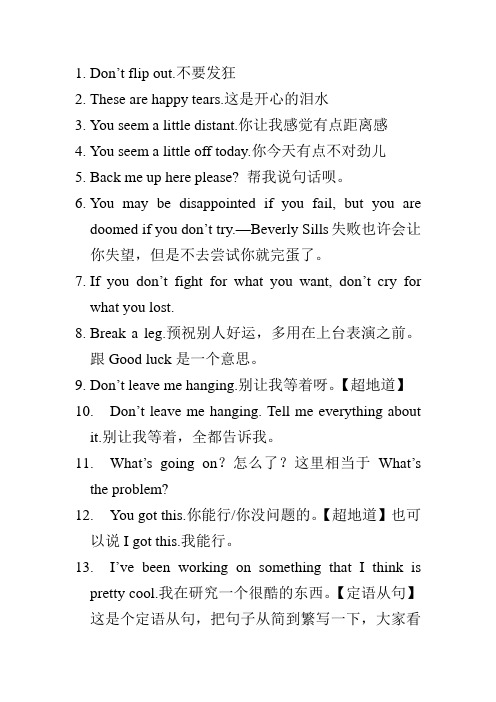
1.Don’t flip out.不要发狂2.These are happy tears.这是开心的泪水3.You seem a little distant.你让我感觉有点距离感4.You seem a little off today.你今天有点不对劲儿5.Back me up here please? 帮我说句话呗。
6.You may be disappointed if you fail, but you are doomed if you don’t try.—Beverly Sills失败也许会让你失望,但是不去尝试你就完蛋了。
7.If you don’t fight for what you want, don’t cry for what you lost.8.Break a leg.预祝别人好运,多用在上台表演之前。
跟Good luck是一个意思。
9.Don’t leave me hanging.别让我等着呀。
【超地道】10.Don’t leave me hanging. Tell me everything about it.别让我等着,全都告诉我。
11.What’s going on?怎么了?这里相当于What’s the problem?12.You got this.你能行/你没问题的。
【超地道】也可以说I got this.我能行。
13.I’ve been working on something that I think is pretty cool.我在研究一个很酷的东西。
【定语从句】这是个定语从句,把句子从简到繁写一下,大家看看是不是就明白了呢?每个句子都是正确的哦。
I’ve been working on something cool.I’ve been working on something that is cool.I’ve been working on something that I think is cool.I’ve been working on something that I think is pretty cool.14.Breathe.深呼吸。
- 1、下载文档前请自行甄别文档内容的完整性,平台不提供额外的编辑、内容补充、找答案等附加服务。
- 2、"仅部分预览"的文档,不可在线预览部分如存在完整性等问题,可反馈申请退款(可完整预览的文档不适用该条件!)。
- 3、如文档侵犯您的权益,请联系客服反馈,我们会尽快为您处理(人工客服工作时间:9:00-18:30)。
商务英语情景对话英语情景对话,商务英语对话- 交流Getting people’s attention 引起别人注意1. Can I talk to you ? 能和你谈一下吗?2. Can we talk? 能一块儿谈谈吗?3. Let’s talk. 我们谈谈吧。
4. Excuse me. You got a minute? 对不起,能耽误你一分钟吗?5. May I have a word with you? 能和你说句话吗?Launching conversation with a piece of news. 讲述一条消息来打开话题1. Listen up. 听着。
2. Now hear this! 你听着!3. Get a load of this. 你听听这个。
(load:大量,许多)4. Are you ready for this? 想听着。
5. Guess what? 你猜怎么的?Asking other people if they understand 问别人是否听明白了1. Do you understand? 你明白吗?2. Do you know that I mean? 知道我的意思吗?3. See what I mean? 明白我的意思吗?4. Do you know what I’m talking about? 知道我讲的是什么吗?5. Know what I’m saying? 知道我在说什么吗?Indicating that you understand 表示明白对方的意思.1. I hear you 知道了.2. I got you. 明白了.3. I can see that. 这一点我明白.4. I hear what you’re saying. 我明白你的意思.5. Okay, I know just what you mean. 嗯,我明白你的意思.If you do not catch what was said 假如你没听清对方说的话.1. I beg you pardon? 对不起,你说什么?2. What was that? 你说什么?3. Say what? 你说什么?4. Excuse me? What did you say? 对不起,你说什么?5. I’m sorry. I missed that. 对不起,我没听清.英语情景对话,商务英语对话- 赞同& 反对Agreement & Disagreement 赞同& 反对Simple agreement 简单的赞同语1. Yes. 是的.2. Yeah. 是的.3. Yep. 是的.4. Yup. 是的. (yeah , yeh 和yup 都是口语中yes的变体. )5. Sure. 当然.Saying that you agree. 表示赞同1. I quite agree with you. 我很赞同你的看法.2. I share your view on that. 对这件事我们看法一致.3. I’m sure you are right. 当然你是对的.4. I don’t think anyone would disagree. 我想没人会反对.5. I have no problem with that. 对这一点我没有异议.Qualified or partial agreement 有保留的或部分赞同1. Could be. 也许.2. If you say so. 既然你这么说.3. So it seems. 好像是这么回事.4. So to speak. 可以那么说.5. In a manner of speaking. 不妨这么说吧.Simple disagreement 简单的反对语1. No. 不2. Nope. 不3. Not really. 不是吧.4. Not at all. 绝不是5. Of course not.当然不是Saying that you disagree. 表示不同意1. I don’t think so. 我不这么想.2. Do you really think so? 你真的这么想吗?3. Don’t be too sure. 别那么肯定.4. Don’t speak too soon. 话不要说得太早.5. I wouldn’t say that. 我并不那么忍为.Showing strong disagreement 表示较强烈的反对.1. No, I won’t agree! Don’t waste your breath. 不. 我不会同意的. 别跟我这儿费口舌.2. Do you expect me to accept that? 你以为我会接受吗?3. Over my dead body! 我死也不会同意!4. What are you talking about? 你在说什么呀?5. Are you kidding? 你在开玩笑吗?[导读]日常英语口语对话:求助情景对话1:A: Is there any chance of my borrowing your type-writer?B: For how long?A: Until the end of the week.B: Yes, I guess that would be all right.情景对话2:A: Would you mind if I borrowed your car?B: Well, when exactly?A: Until Monday or Tuesday of next week.B: I'm sorry, but it's just not possible.情景对话3:A: Do you think you could lend me some of your records?B: Until when?A: Oh, just over the holidays.B: I'm not sure. I'll have to think about it.情景对话4:A: I was wondering if you'd let me stay with you for a few days. B: It really depends on when.A: Until next weekend, if that's OK.B: Let me think it over, and I'll let you know later.日常交际英语口语:道谢情景对话1:A: I'd better be going.B: So soon? Why don't you stay a little longer?A: I wish I could, but it's already late.B: Oh, it's a shame that you have to leave.A: Thank you for a wonderful meal.B: I'm glad you enjoyed it.情景对话2:A: I really must be going now.B: But you just got here. Can't you stay a little longer?A: That's very nice of you, but I really can't.B: Well, it's too bad that you have to go.A: Thanks very much. It was a great party!B: It was our pleasure.情景对话3:A: I think it's about time we got going.B: What? Already? Won't you have more coffee?A: I'd love to, but I have to get up early tomorrow.B: Oh! I'm sorry. I wish you could stay.A: Thank you for a very enjoyable evening.B: Don't mention it. I hope you can come again soon.情景对话4:A: I really should be on my way.B: Oh, not yet! At least have one for the road.A: No. Thanks all the same.B: Well, I'm sorry you have to leave so early.A: Thank you very much. We really had a good time.B: Well, thank you for coming.餐厅英语情景对话来源:餐饮管理发布时间:2009年11月25日点击数:16050 【字体:小大】【收藏】A: What can I do for you, sir?先生,您要来点什么?B: What have you got this morning?今天早上你们这儿有什么?A: Fruit juice, cakes and refreshments, and everything.水果汁、糕点、各种茶点等等,应有尽有。
B: I’d like to have a glass of tomato juice, please.请给我来一杯西红柿汁。
A: Any cereal, sir?要来点谷类食品吗,先生?B: Yes, a dish of cream of wheat.好的,来一份麦片粥。
A: And eggs?还要来点鸡蛋什么的吗?B: Year, bacon and eggs with buttered toast. I like my bacon very crisp.要,再来一份熏猪肉和鸡蛋,我喜欢熏猪肉松脆一点。
A: How do you want your eggs?您喜欢鸡蛋怎么做?B: Fried, please.煎的。
A: Anything more, sir?还要什么别的东西吗,先生?B: No, that’s enough. Thank you.不要了,足够了。
